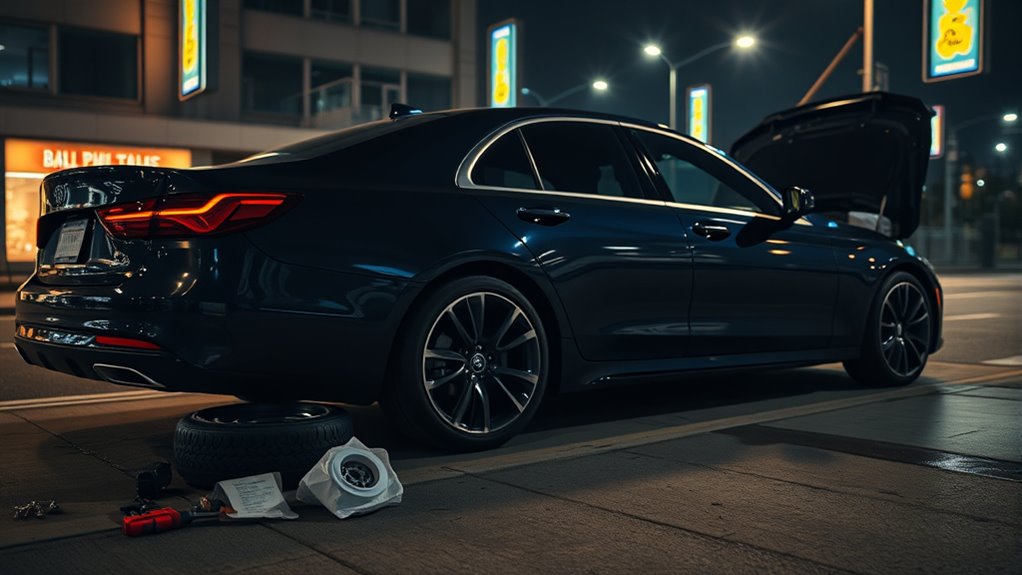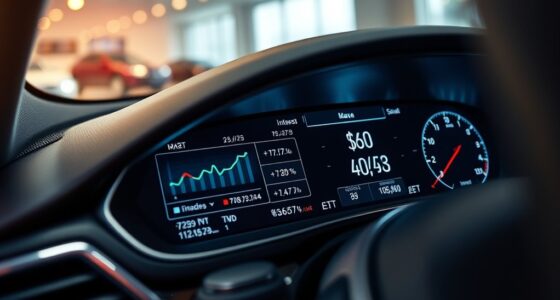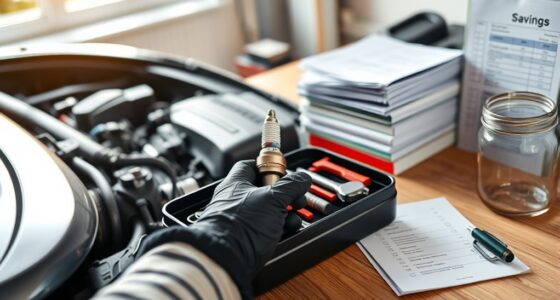Owning a luxury car means facing hidden costs beyond the purchase price. You’ll see faster depreciation, so your vehicle loses value quickly, even with proper care. Maintenance and repairs are more expensive, with costly parts and skilled labor needed. Insurance premiums are higher as well, reflecting increased theft and vandalism risks. These ongoing expenses can add up over time. To understand all the financial implications, discover how these hidden costs impact your long-term investment.
Key Takeaways
- Luxury cars have higher maintenance and repair costs due to expensive parts and specialized labor.
- Insurance premiums for luxury vehicles are elevated, reflecting increased theft risk and replacement expenses.
- Depreciation accelerates quickly after purchase, leading to significant long-term financial loss despite meticulous upkeep.
- Hidden costs include higher routine service expenses and potential expenses from market value decline.
- Overall ownership costs—depreciation, maintenance, insurance—often surpass initial purchase price, impacting long-term investment.

Owning a luxury car often comes with the promise of superior performance and style, but many drivers overlook the hidden costs that can quickly add up. One of these costs is tied to luxury branding, which often inflates the initial purchase price. When you buy a high-end vehicle, you’re paying for the prestige and exclusivity that come with the brand. While that can be appealing, it also means your car’s value may not hold as well as you expect. Luxury brands tend to have a higher resale depreciation rate, meaning the vehicle loses value faster than more affordable cars. This depreciation impacts your long-term investment, often leaving you with less when it’s time to sell or trade in.
Luxury cars often depreciate faster, impacting long-term value despite the brand prestige.
Resale depreciation is a vital factor to consider before committing to a luxury model. The moment you drive it off the lot, its value begins to decline sharply, especially for brands known for their luxury branding. Even if you maintain the car meticulously, the market often values these vehicles less over time compared to non-luxury counterparts. This accelerated depreciation means you might find yourself facing significant financial loss when upgrading or switching vehicles. It’s essential to understand that owning a luxury car isn’t just about the initial expense; the long-term resale value can be markedly lower than what you paid, making it a less economical choice in the long run.
Beyond depreciation, luxury branding influences other hidden costs. Many luxury vehicles require specialized maintenance and repairs, which tend to be more expensive than standard cars. Parts are often more costly, and not every mechanic has the expertise to work on high-end models. This means you’ll likely pay a premium for routine service or repairs, adding to your total ownership costs. Additionally, insurance premiums for luxury cars are generally higher, reflecting their higher replacement costs and increased risk of theft or vandalism. All these factors contribute to the ongoing financial commitment that many owners overlook when initially captivated by the sleek design and brand prestige.
Furthermore, financial considerations such as higher insurance premiums and maintenance costs can significantly impact the overall ownership expenses, making it essential to evaluate the true long-term cost of owning a luxury vehicle. In the end, owning a luxury car involves more than just enjoying its performance and status. You need to be prepared for the hidden costs, from rapid resale depreciation to costly maintenance, insurance, and the impact of luxury branding on the vehicle’s overall value. Understanding these factors helps you make more informed decisions and prevents unpleasant surprises down the road.
Frequently Asked Questions
What Are the Insurance Premium Differences for Luxury Cars?
When considering luxury car insurance, you’ll notice premium rate factors play a big role in the cost. Luxury car insurance premiums tend to be higher than standard cars because of their higher repair costs, theft rates, and specialized coverage needs. You might pay markedly more, especially if your luxury vehicle has a history of higher theft or accident rates. Always compare policies to find the best coverage that fits your budget and needs.
How Does Depreciation Affect the Overall Cost?
Depreciation substantially impacts your overall costs because luxury cars tend to lose value quickly, especially if you’ve customized them with high-end features. This reduces your car’s resale value over time. Your luxury brand reputation may help maintain some value, but customization expenses often don’t translate into higher resale prices. So, while you enjoy the prestige, remember that rapid depreciation can make your ownership more costly in the long run.
Are There Any Hidden Taxes or Fees?
When considering hidden taxes or fees, you should be aware of the luxury tax, which increases costs for high-end vehicles, and registration fees, that can vary by location. These expenses often catch owners off guard, adding to the overall cost of owning a luxury car. Always check local regulations to understand these additional charges, so you’re prepared for the true financial commitment involved in maintaining your luxury vehicle.
What Are the Costs for Specialized Maintenance and Repairs?
When it comes to costly repairs and specialized maintenance, you’ll notice luxury parts are pricier, often requiring expert technicians. These specialized specialists handle delicate details, demanding higher hourly rates. Regular upkeep, from replacing luxury parts to precision tuning, quickly adds up. You’ll want to budget for the big bills, knowing that premium parts and professional services keep your luxury car performing perfectly, but at a premium price.
How Does Luxury Car Ownership Impact Resale Value?
Luxury car ownership can positively impact resale value thanks to luxury branding, which attracts buyers seeking prestige and quality. However, if you neglect proper maintenance, it may reduce the car’s appeal in the resale market, lowering its value. Keeping up with recommended repairs and servicing preserves the vehicle’s condition, ensuring you get the best possible return when you decide to sell. Proper care aligns with luxury branding expectations and enhances resale prospects.
Conclusion
So, while a luxury car might seem like a symbol of status, don’t forget the hidden costs lurking beneath the surface. From hefty maintenance bills to unexpected repairs, those expenses add up faster than you’d think. Some say the true cost of luxury is just the price you pay for exclusivity, but in reality, it’s the ongoing financial drain that often catches owners off guard. Stay warned, and budget wisely—luxury isn’t always as glamorous as it seems.









